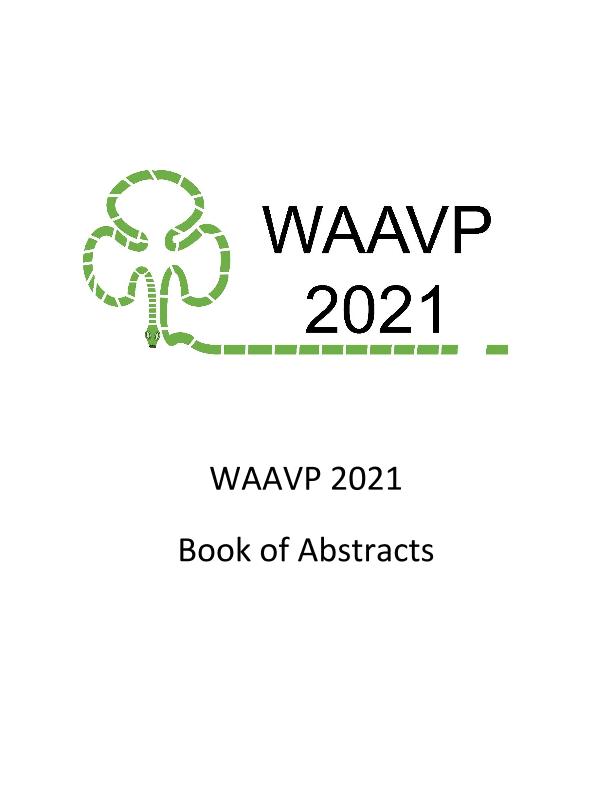Evento
Characterization of a new albendazole resistant Fasciola hepatica isolate
Martínez Valladares, María; Valderas García, Elora; Castilla Gómez de Agüero, Verónica; González Warleta, Marta; Ceballos, Laura ; Liron, Juan Pedro
; Liron, Juan Pedro ; Sanabria, Rodrigo; Pruzzo, Cesar Ivan; Alvarez, Luis Ignacio
; Sanabria, Rodrigo; Pruzzo, Cesar Ivan; Alvarez, Luis Ignacio
 ; Liron, Juan Pedro
; Liron, Juan Pedro ; Sanabria, Rodrigo; Pruzzo, Cesar Ivan; Alvarez, Luis Ignacio
; Sanabria, Rodrigo; Pruzzo, Cesar Ivan; Alvarez, Luis Ignacio
Tipo del evento:
Conferencia
Nombre del evento:
28th International Conference of tha World Association for the Advancement of Veterinary Parasitology
Fecha del evento:
19/07/2021
Institución Organizadora:
World Association for the Advancement of Veterinary Parasitology;
University College Dublin;
Título del Libro:
Book of Abstracts: 28th Conference of the World Association for the Advancement of Veterinary Parasitology
Editorial:
World Association for the Advancement of Veterinary Parasitology
Idioma:
Inglés
Clasificación temática:
Resumen
Characterization of a new albendazole resistant Fasciola hepatica isolateMaría Martínez-Valladares11,2, Elora Valderas-García1,2, Verónica Castilla Gómez de Agüero1,2, Marta González-Warleta3, Laura Ceballos4, Juan P. Lirón4, Rodrigo Sanabria5, Cesar Pruzzo5, Luis I. Alvarez4.1Instituto de Ganadería de Montaña (CSIC-Universidad de León), Departamento de Sanidad Animal (Department of Animal Health), León, Spain.2Departamento de Sanidad Animal (Department of Animal Health), Facultad de Veterinaria, University of Leon, Leon, Spain.3Laboratorio de Parasitología, Centro de Investigaciones Agrarias de Mabegondo, AGACAL, Abegondo, A Coruña, Spain.4Laboratorio de Farmacología, Centro de Investigación Veterinaria de Tandil (CIVETAN), UNCPBA-CICPBA-CONICET, Facultad de Ciencias Veterinarias, Tandil, Argentina.5Laboratorio de Parasitología, Facultad de Ciencias Veterinarias, Universidad Nacional de la Plata (UNLP), La Plata, Argentina.The infection by Fasciola hepatica affects mainly ruminants although is present in a wide variety of species including humans. Fasciolosis control is mainly based on triclabendazole administration, the main drug indicated in humans. Albendazole (ABZ) is used against nematode and liver fluke infections in ruminants. The misuse of these drugs has led to the appearance of anthelmintic resistance. In this study, we characterized an ABZ resistant isolate and evaluate the use of a combined treatment to improve treatment efficacy. The isolate was collected from a slaughterhouse in Argentina, maintained under laboratory conditions and identified by means of the egg hatch test (EHT). Using these eggs metacercariae were produced to infect sheep artificially. When flukes reached the adult stage, animals were divided into two groups, one treated with ABZ (7.5 mg/kg bw) and another with a placebo. All sheep were slaughtered at day 14 post-treatment to collect and count the number of flukes. The resistance of ABZ was confirmed with a reduction of 44% of adult flukes in the treated group. At the necropsy, adult flukes from the livers and eggs from the gall bladders, both from sheep treated with the placebo, were collected. Adult flukes were maintained alive in RPMI medium to let them to excrete eggs for 24 hours. EHT was conducted and different results were observed with the two egg sets. The EHT performed with eggs collected directly from gall bladder confirmed the resistant status of the isolate. However, the EHT with eggs recovered from flukes resulted in a susceptible phenotype, showing that only previously laying eggs (in bile) can express the resistant phenotype. After producing more metacercariae from this resistant isolate, we are testing in vivo the efficacy of a combined treatment to improve its efficacy. The results will be presented during the WAAVP meeting.
Palabras clave:
FASCIOLA HEPATICA
,
RESISTENCIA
,
BENZIMIDAZOLES
Archivos asociados
Licencia
Identificadores
Colecciones
Eventos(CIVETAN)
Eventos de CENTRO DE INVESTIGACION VETERINARIA DE TANDIL
Eventos de CENTRO DE INVESTIGACION VETERINARIA DE TANDIL
Citación
Characterization of a new albendazole resistant Fasciola hepatica isolate; 28th International Conference of tha World Association for the Advancement of Veterinary Parasitology; Dublin; Irlanda; 2021; 86-87
Compartir



